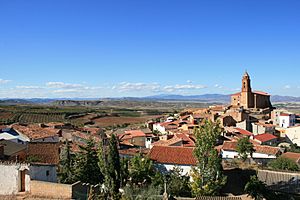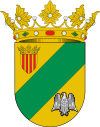Olvés facts for kids
Quick facts for kids
Olvés
|
|||
|---|---|---|---|
 |
|||
|
|||
| Country | Spain | ||
| Autonomous community | Aragon | ||
| Province | Zaragoza | ||
| Municipality | Olvés | ||
| Area | |||
| • Total | 20 km2 (8 sq mi) | ||
| Population
(2018)
|
|||
| • Total | 106 | ||
| • Density | 5.3/km2 (14/sq mi) | ||
| Time zone | UTC+1 (CET) | ||
| • Summer (DST) | UTC+2 (CEST) | ||
Olvés is a small town, also known as a municipality, located in the province of Zaragoza. This area is part of Aragon, one of Spain's many regions. It's a quiet place, with a population of about 106 people as of 2018. Imagine a community where everyone likely knows each other!
Contents
Discovering Olvés
Olvés is nestled in the beautiful Spanish countryside. It's a great example of a traditional Spanish village. These small towns are important parts of Spain's history and culture.
Where is Olvés Located?
Olvés is found in the northeastern part of Spain. It's in the province of Zaragoza. This province is part of the larger Aragon region. Aragon is known for its diverse landscapes. These range from mountains to plains.
What is a Municipality?
A municipality is like a local government area. It's similar to a town or a small city. Olvés is one of many municipalities in Spain. Each one has its own local government. This government helps manage things like roads and local services.
Life in Olvés
Life in a small municipality like Olvés is often peaceful. People here might work in farming or local businesses. The community spirit is usually very strong.
Population and Size
In 2018, Olvés had 106 residents. This makes it a very small community. The municipality covers an area of 20 square kilometers. That's about 7.7 square miles. It's a compact area, easy to explore.
Climate and Environment
The climate in this part of Spain can vary. Summers are often hot and dry. Winters can be cool. The natural surroundings are typical of the Aragon region. You might see rolling hills and traditional Spanish plants.
History of Olvés
Like many places in Spain, Olvés has a long history. Its roots likely go back many centuries. Small towns often played a big role in local life. They were centers for farming and trade.
Historical Significance
Many Spanish municipalities have ancient origins. They might have been settled by different groups over time. This includes Romans, Visigoths, and Moors. Each group left its mark on the culture and architecture.
See also
 In Spanish: Olvés para niños
In Spanish: Olvés para niños
 | William M. Jackson |
 | Juan E. Gilbert |
 | Neil deGrasse Tyson |



